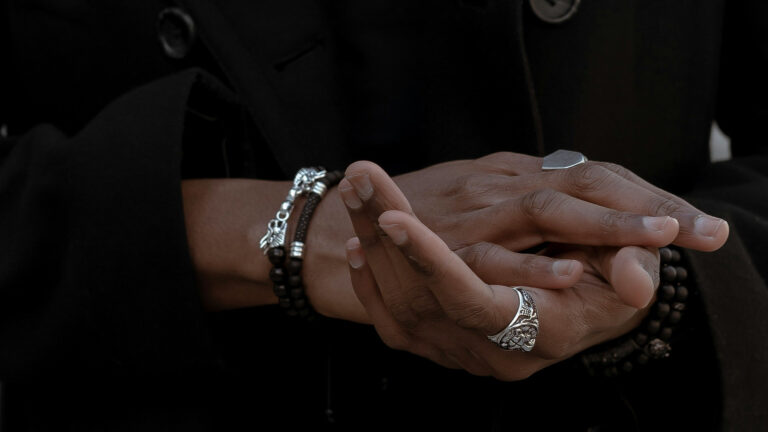If you follow Jesus, then you know that the struggle against personal sin is constant. Sin always seems to be crouching at the door. So how do you fight it? Maybe we say to ourselves, “Stop it!” Perhaps we pray, “Lord, help me not to do this.” Maybe we act by fleeing or shutting down a particular moment of greed or lust or loose lips. Maybe we guard our ways by limiting what we see or touch or do.
Wisdom will put boundaries in place. But, if that’s all we’re doing, then we’re missing something
Getting A Better Grip on Personal Sin
Do those sound like your normal courses of action? They are decent. For instance, it’s right to turn away from sin. Joseph, in godliness, fled the advances of another man’s wife (Genesis 39). And wisdom, driven by godly desire, will put boundaries in place. But, if that’s all we’re doing, then we’re missing something. Or rather, there are ways in which followers of Jesus can strengthen this initial and immediate good response against personal sin.
1. Link Your ‘No’ To A Why
Too often Christians are simply the ‘no’ people. But only having a list of ‘no’ items can make us not much more than a moralistic atheist or a pious Muslim. Instead, we need to see that our ‘no’ is anchored to the reality of God and his ways, and to our life in Christ. That means there is distinctive gospel power behind our ‘no.’ One that has far more stopping power!
Look at the Scriptures. Colossians 2 reminds us that rules like “do not handle or taste or touch,” and even harsh treatment of the body, lack any real value in curbing indulgences of the flesh (Colossians 2:20-23). That describes mere religious self-denial over sin – saying ‘no’ and even putting in place steps to curb personal sin. But Paul says it isn’t enough.
Taking On A New Identity in Christ
Instead, Paul lifts our hearts to our true life found in Christ (Colossians 3:1-4). We’ve died, and our life is hidden with Christ in the heavenly realms. And then Colossians 3:5 says, “put to death therefore whatever belongs to your earthly nature.” Things like sexual immorality, impurity, lust, evil desires, and greed, which is idolatry.
We put our sin to death because it’s not part of the new and true reality of our life in Christ. It doesn’t fit
Here’s the point. Yes, we must do something about our sin: put it to death! There’s the ‘no’. But did you see the ‘therefore’? That lets us know that the reality of Colossians 3:1-4, captures why we put our sin to death. The gospel why matters! We put our sin to death because it’s not part of the new and true reality of our life in Christ. It doesn’t fit.
As Colossians 3:8 goes on: rid yourself of things like anger, rage, malice, slander, and filthy language. But why? Because that’s part of your old life (Colossians 3:7). That’s part of the old self you’re taking off and replacing with the new (3:9-10).
The Gospel Why
The Christian’s ‘no’ against sin isn’t an attempt to merely be religious or moral. We must be careful not to give that impression. Instead the Christian’s ‘no’ to sin finds its power in the gospel why, for instance, in who God is and who he has made us to be.
The Christian’s ‘no’ to sin finds its power in the gospel why, in who God is and who he has made us to be
So, get practical. As we fight sin, even begin with this simple thought: “I’m saying no, because this isn’t who God made me in Christ.” Read Colossians 3:1-11, Ephesians 4:17-5:21 and 1 Peter 1:18-2:3. Strengthen and broaden your convicted ‘no’ by picking up how often the commands to flee or kill or put off sin are linked to whys. This is the gospel fuel for our ‘no,’ and it can toughen our godly resolve.
2. Focus On The Greater Desire
For the long term, here’s the single greatest weapon to combat personal sin. Life involves desire. Christians sometimes speak of desire as only bad. But that’s not true. And it certainly isn’t helpful. Desire can be good. It’s God-given. Desire is good if it’s for the right thing, like God and his ways. Or if it’s for the right thing in the right place, such as sex within marriage. How can knowing this help us fight sin?
Often our sin battles boil down to misplaced desire.
The Challenge of Idolatry
Often our personal sin battles boil down to misplaced desire. Return to Colossians 3:5 and notice how the verse ends. We have a list of things (sexual immorality, impurity, lust, evil desires and greed) ending, “which is idolatry.” The issue is that something has taken the place of God – that’s idolatry. The description could be referring to the whole list, or it could just be greed. This doesn’t really matter. All of the items are driven by desire of some kind, by a search to replace God. And the misguided hope that the “thing” will fill the gap in our hearts. The problem isn’t desire. It’s misplaced desire.
So, what’s the answer to fighting even those particular sins listed above? It’s to have our hearts filled with the truer and greater desire of knowing and delighting in God. I find the title and content of a Thomas Chalmers tract, The Expulsive Powers of a New Affection, very helpful here. Since part of our struggle with sin is misplaced desire, then one of the ways to combat our desire for wrong things, or for right things in the wrong context, is to instead have a greater desire for God to wash out these lesser desires.
How to Choose Your Desires Well
Think of a fresh wind coming in to drive out stale air. We don’t fight our desire for sin by primarily not desiring that sin, but by instead having it pale in comparison to the truer and greater desire for God. Having that fill, and continuing to fill, our hearts and lives. When we are content in him, that misplaced desire for the trinkets and trappings of the world lose some of their sparkling appeal.
We don’t fight our desire for sin by primarily not desiring that sin, but by instead having it pale in comparison to the truer and greater desire for God
God made us to love and desire. But sin often tempts us to desire what won’t satisfy, or to desire good things in the wrong contexts. Both of these are destructive. Instead we’re to fill and feast ourselves on the Triune One who truly satisfies.
A by-product of this is that we will be strengthened against personal sin. So, how do we practically do that? It’s not rocket science. Keep humbly coming to God, through the Scriptures by the Spirit, believing that he is who he says he is and will reward those who seek him (Hebrews 11:6). Gather alongside other zealous brothers and sisters to spur one another on to greater delight in him.
3. Don’t Forget Good Works
In my opinion, here’s the most forgotten way to strengthen combat against personal sin. Reformed Evangelicals, like me, can sometimes be skittish about good works. As people of Jesus’ cross, we stress that no good works can make us right with God. This is crucial. But it’s not the full story.
Think about Ephesians 2:10. Paul paints a beautiful picture of Christians as those God has recreated in Christ Jesus for good works. Or 1 Peter 2:11-3:7, which mentions again and again the desired presence of good works. Titus 3 does the same.
Paul paints a beautiful picture of Christians as those God has recreated in Christ Jesus for good works (Ephesians 2:10)
Good Works in Their Right Place
Context matters, and two things from these verses are particularly worth noticing. First, good works don’t carry the power to earn God’s favour. Ephesians 2:10 is clear that God prepared them for us to do. So, even in our good works, God gets the glory. Not us.
Second, most often these good works are, as in 1 Peter and Titus, done in the context of the watching world. Again, this is so that God will be praised. But keep the main point: as those recreated in Christ by the Spirit, God desires for us to abound in good works, all to his praise. Here we can recognise how good works can help us fight personal sin.
Tackling The Personal Sin of Pornography
Martin Luther, that turbulent German brother, understood that good works form part of how God disciplines our bodies, the playground of our sin struggles. He preached that good works were given by God to discipline our flesh. How so? Let me take a practical struggle all too present for many Christian men and women: pornography.
Nothing quite starves some sins like serving others
Often our plan of attack concentrates on the sin itself. “I will not look at porn.” That’s the negative side of the fight. But what if we also focussed on the positive side of the fight? What if we focussed on growing in both our love for God and love for others, pouring our energies out in serving? I think we’d find that along the way we’ve eaten up much of the energy a particular sin requires to live and breathe. We’ve starved it with godliness and good works. For nothing quite starves some sins like serving others. This is part of God’s good design in Christ.
The Danger of ‘Me-Time’
Think of a person whose life revolves almost entirely around themselves and their own comfort. Someone with much ‘free-time’ (aka ‘me time’) on their hands. Frankly, I wouldn’t be surprised if porn is one of their struggles. This scenario wouldn’t apply to everyone, but carry and apply the point to yourself. A little like David’s folly with Bathsheba (2 Samuel 7), or Cain and Abel (Genesis 4). How often might our personal sin be linked to us not being where we should be, and not doing what we should be doing? Followers of Jesus have been recreated for good works.
Pulling It Together to Tackle Personal Sin
Romans 6:12-13 (CSB) reads: “Therefore, do not let sin reign in your mortal bodies, so that you obey its desires. And do not offer any parts of it to sin as weapons for unrighteousness.” Don’t let sin reign in your bodies. Do not offer any parts of it to sin! There’s a ‘no’ to carry out. But pause and consider how our three points might strengthen things.
- The why to our ‘no’ is highlighted by the ‘therefore’ that begins the verse. We’re asked to sit in the reality of 6:10-11: we’ve died to death, and we live to God. By the Spirit, let that fuel our ‘no’.
- We notice the centrality of desire to sin struggles (“so that you obey its desires”). We need to keep up our long-term pursuit of the truest desire.
- Finally, Romans 6:13 ends: “But as those alive from the dead, offer yourselves to God, and all the parts of yourselves to God as weapons for righteousness.” Here’s the final arrow for our quiver. A life recreated in Christ where we positively offer ourselves to God and the parts of ourselves as weapons for righteousness. Giving ourselves in service of others is a very practical way to do that.
On this side of Christ’s return, sin will be a struggle. You must continue saying ‘no’ to personal sin. But God gives greater depth and strength to that ‘no’ with the why. And instead of only being known as ‘no’ people, pursue the greater ‘yes!’, a focus on the greater God-ward desire. And don’t forget good works particularly towards others, as people reshaped in Jesus.














